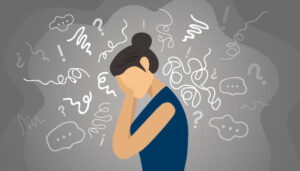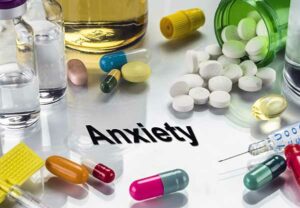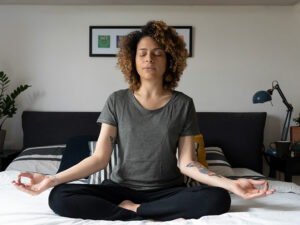Contents
What Is Anxiety?
Anxiety is one of the most common mental health disorders in the world. It is characterized by feelings of worry, fear, and unease that can be either mild or severe. Anti-anxiety meds are helpful in treating the symptoms of anxiety. Symptoms of anxiety can include-

- Chest pain
- Nausea
- Dizziness
- Shortness of breath
- Rapid heart rate
- Trembling
Anxiety is a normal human emotion that everyone experiences. It is the body’s way of responding to danger or stress, and can actually help you stay safe. However, for some people experiencing anxiety becomes a major problem that affects their day-to-day life.
For example, if someone has an anxiety disorder they might have feelings of fear or worry all the time, which may make it difficult to concentrate. In addition, someone with an anxiety disorder might have a hard time making or keeping friends because they may be afraid that people will judge them based on their appearance or behavior.
How Does Anxiety Affect Mental Health?
Anxiety can affect mental health in a number of ways. It can lead to panic attacks, which are episodes of intense fear and anxiety that can last for several minutes or hours. Anxiety can also cause people to feel constantly on edge and stressed out. This can lead to problems such as insomnia, depression, and addiction.
Anti-Anxiety Medications

Anti-anxiety meds work by altering brain function in a way that helps decrease anxiety. This change in brain chemistry is what allows the patient to feel more relaxed and less worried about their condition.
Benzodiazepines
Benzodiazepines are anti-anxiety meds that act on the GABA receptors in the brain, which reduces the activity of neurons and balances certain hormone levels. Some commonly prescribed benzodiazepines include Ativan (lorazepam), Valium (diazepam), Xanax (alprazolam), and Klonopin (clonazepam). Benzodiazepine medications work well for anxiety, but they can also be habit-forming and cause physical dependence with long-term use.
Buspirone
Buspirone is another commonly prescribed anti-anxiety medication for anxiety disorders that works by binding to serotonin receptors in the brain, which reduces anxious feelings. This medication is not habit-forming and tends to cause fewer side effects than benzodiazepines.
Beta-blockers
Beta-blockers anti-anxiety meds are often prescribed for people with high blood pressure or irregular heartbeats, but they can also be used in small doses to reduce anxiety. They work by blocking beta receptors in the brain, which makes it difficult for the patient’s body to respond to stress hormones like cortisol. While this medication is fairly effective at reducing anxiety, there are some potential side effects that may make it more difficult for patients to tolerate, including sexual dysfunction and fatigue.
Antidepressants
Antidepressants are another type of anti-anxiety meds that alters brain chemistry through various actions on serotonin receptors in order to decrease anxious feelings. There are several different types of antidepressants that people may take. Including selective serotonin reuptake inhibitors (SSRIs), serotonin-norepinephrine reuptake inhibitors (SNRIs), tricyclic antidepressants, and tetracyclic antidepressants.
Research has shown that some natural remedies can reduce anxiety in the same way as certain prescription anti-anxiety meds. These include probiotics, meditation, omega fatty acids, St. John’s Wort, kava root, passionflower extract, lemon balm, valerian root extract, ashwagandha root extract, L-theanine, chamomile tea, green tea, holy basil leaf extract, magnolia bark extract, SAM-e (s-adenosylmethionine), and bacopa monnieri.
Anxiety can be utterly overwhelming and it is important to remember that there are many resources available to you if you’re struggling with this condition. There are helpful coping strategies, prescription medications, and natural remedies available for people who have developed an anxiety disorder as a result of some type of trauma or from enduring issues related to mental health.
Finding The Right Anti-Anxiety Meds

If you are struggling with anxiety, it is important to find the right medication to help you manage your symptoms. There are a variety of different types of anti-anxiety medications available, including benzodiazepines, buspirone, beta-blockers, and antidepressants.
Each type of medication works differently in the brain and has different side effects. It can be difficult to determine which medication is the best for you, but your doctor can help you figure out which one is most likely to help you feel better.
It is important to remember that it may take some time to find the right medication and dosage for you. You may have to try a few different types before you find one that works well. Be sure to talk to your doctor to see what they recommend for you.
Things To Remember When Taking Anti-Anxiety Meds
It can be important to make sure that you are taking your medication correctly to ensure that it works well and helps you manage your symptoms of anxiety. Most medications come with information about how best to take them, including dosage recommendations.
Sometimes, people who are struggling with anxiety may forget or overlook this information because they are anxious themselves. This can lead to the medication not working properly, which may cause feelings of frustration for both you and your healthcare provider.
It is important to try your best when it comes to following the instructions on the label of any medication that has been prescribed for you by a healthcare professional. You can also ask questions about how best to take the medication so that you are on track for success.
Anti-Anxiety Meds Overdose

There are several types of anti-anxiety medications available, including benzodiazepines, buspirone, beta-blockers, antidepressants, and more. While these medications can be helpful in reducing feelings of anxiety in people who struggle with this condition. They can also be dangerous if someone accidentally takes too much of them or mixes them with certain substances.
Overdosing on anti-anxiety medication is a serious situation that may result in severe medical emergencies requiring immediate medical attention. If you suspect that someone has overdosed on any type of prescription psychiatric drug like an SSRI antidepressant or benzodiazepine-like Xanax (alprazolam). You must seek medical attention immediately.
If you believe that your loved one has taken too much of their medication, either intentionally or accidentally. It is important to call 911 right away. There are some medications that can be used to treat an overdose before getting more specialized help. For example, naloxone can be used for benzodiazepine overdoses and activated charcoal can be used for antidepressant and other psychiatric drug overdoses.
It is also helpful if family members educate themselves on how best to recognize the signs of a medication overdose. So they know when it’s time to get help. Unfortunately, many people who struggle with anxiety never receive proper treatment. That leaves them at risk to harm others and engage in dangerous behaviors such as driving under the influence. Anxiety can also lead to suicide. That is why it is so important to find the right type of anxiety treatment for you.
Alternatives For Coping With Anxiety

There are a number of things that can be done to reduce anxiety. Some common coping techniques include mindfulness, deep breathing exercises, and engaging in activities that help you relax and lose yourself in the moment.
Activities that Help Relieve Anxiety
Anxiety can keep people from living life to its fullest and finding happiness. Activities such as exploring nature, watching TV, or simply spending time with friends can all be helpful in reducing anxiety.
Mental health professionals like therapists and counselors help people reduce anxiety through talk therapy. Therapy for anxiety can help people change their thought patterns in order to reduce anxiety.
Talk Therapy
Therapy for anxiety will usually start with talk therapy, where people discuss thoughts and feelings related to their anxiety. Once this has begun, therapists may instruct patients to do guided imagery exercises in which they imagine themselves in situations that calm them down. After talking out any worries or fears, therapists will assign homework to help people reduce anxiety.
Cognitive-behavioral therapy
Cognitive-behavioral therapy (CBT) is a type of talk therapy that trains your brain to think differently, and can be very helpful in reducing anxiety. CBT has been shown to be effective in treating anxiety disorders as well as other mental health disorders like depression and addiction. CBT sessions usually start with the therapist asking the patient questions about their thoughts, feelings, and behaviors that are related to their condition. Then, these thoughts and behaviors will be challenged in order to reduce anxiety.
Exercise
Exercise can be a great way to relieve anxiety because it releases feel-good endorphins. It can also help reduce stress and anxiety by getting the heart pumping and releasing energy. Some studies have suggested that exercise may be as effective as certain medications in reducing anxiety, but it is important to note that research on this topic is still very young.
Probiotics
Probiotics are beneficial bacteria that live inside your body. They help keep your digestive system healthy and prevent bad bacteria from growing out of control. In addition, probiotics have been shown to reduce anxiety in animal studies involving rats and birds. Some research also suggests that women who take probiotics while pregnant may be more likely to have children who develop mental health disorders like anxiety later on in life.
Meditation
Meditation can be a great way to reduce anxiety by changing the way your brain responds to stress. It does this by causing the brain waves to slow down, which makes people feel less tense and keyed up. There are several different types of meditation that people may practice, including mindfulness meditation, transcendental meditation, and yoga.
Mental health professionals like therapists and counselors can help people reduce anxiety by talking about their thoughts, feelings, and experiences with anxiety. They may also suggest activities for people to try at home that will help them relax and feel more relaxed in the moment.
Anxiety disorders can affect all different age groups and genders, but some of the most common types include social anxiety disorder, panic disorder, obsessive-compulsive disorder, and generalized anxiety disorder. These disorders are often treated with medications known as anti-anxiety drugs.
Conclusion
Anti-anxiety medications are prescribed to help individuals who suffer from anxiety disorders. These drugs work by affecting the way certain brain chemicals function, which in turn reduces anxiety levels. While anti-anxiety medications can be helpful for some people, they can also have negative side effects. It is important to consult with a doctor before taking these drugs and to carefully weigh the pros and cons of using them.
If you are looking for affordable Online Counseling MantraCare can help: Book a trial therapy session


